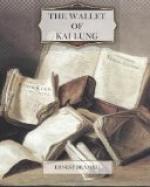“Chief among the sublime virtues enjoined by the divine Confucius,” began Ling, folding his arms and speaking in an unmoved voice, “is an intelligent submission—” but at that word he fell beneath a rain of heavy and unquestionably well-aimed blows.
VII
Between Si-chow and the village of Ki, in a house completely hidden from travellers by the tall and black trees which surrounded it, lived an aged and very wise person whose ways and manner of living had become so distasteful to his neighbours that they at length agreed to regard him as a powerful and ill-disposed magician. In this way it became a custom that all very unseemly deeds committed by those who, in the ordinary course, would not be guilty of such behaviour, should be attributed to his influence, so that justice might be effected without persons of assured respectability being put to any inconvenience. Apart from the feeling which resulted from this just decision, the uncongenial person in question had become exceedingly unpopular on account of certain definite actions of his own, as that of causing the greater part of Si-chow to be burned down by secretly breathing upon the seven sacred water-jugs to which the town owed its prosperity and freedom from fire. Furthermore, although possessed of many taels, and able to afford such food as is to be found upon the tables of Mandarins, he selected from choice dishes of an objectionable nature; he had been observed to eat eggs of unbecoming freshness, and the Si-chow Official Printed Leaf made it public that he had, on an excessively hot occasion, openly partaken of cow’s milk. It is not a matter for wonder, therefore, that when unnaturally loud thunder was heard in the neighbourhood of Si-chow the more ignorant and credulous persons refused to continue in any description of work until certain ceremonies connected with rice spirit, and the adherence to a reclining position for some hours, had been conscientiously observed as a protection against evil.




